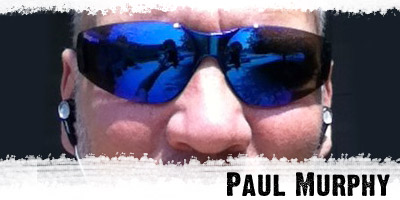
Age: 45
Height: 6'1”
Weight: 175 lbs
Birthplace: Chicago, IL
Current Residence: Schererville, Indiana
Sports: Yoga; Road and Trail Running; Road and Mountain Cycling; light Kettle-Bell Training.
Why did you become vegan?
I became a vegan after being a lacto-vegetarian for 8 years, and discovering health issues due to the cheese and dairy intake in that diet. I got a Costco membership card and started buying 5 lb blocks of cheese, I loved heavy cream in my coffee, pizza was on the menu two days a week, and enjoyed eating a lot of different ice cream. It wasn't until I started having back problems from being over-weight, and my mother who shared the same items, had to have a quadruple open heart by-pass because of it. I couldn't wear the same pants that I wore for years, pretty much overnight, and went from an average of 185-lbs to over 210 for the first time. It was funny when I went to a chiropractors office and they weighed me. I told them their scale must be broken. I got on it again with the same results and was shocked.
It was an almost immediate realization that the issue was diet related. I quit instantly, and veganism began that day nearly eight years ago. I really loved pizza too!
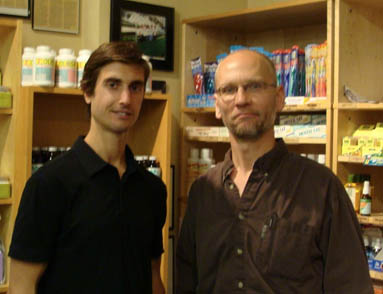
When and why did you become interested in fitness?
I've been in some kind of activity since I was in cross-country in 6th grade. It really wasn't until the 1980's, when I was a paratrooper in the 82nd Airborne Division, that diet and fitness was part of my daily life. As a sergeant I even had to conduct physical fitness training.
After my time in service I ran a 10K run for the first time, rode a mountain bike a little, then stopped everything for nearly twenty years.
For no particular reason, in 2008 I started running again at a walk-run pace for two miles at a time. Eventually I was up to running without walking, then getting up to 3 miles. I entered the 2008 Nike+ Human Race 10K, and finished it running. During that time the 2008 Olympics in Beijing, China, was going on. I was so pumped up and inspired by the over 40 year old athletes, competing with all the teens and twenty year olds, that I made a choice to enter into the 2008 Chicago Marathon. Registration was closed, so I had to wait until 2009. Until then I continued running, and joined a local fitness stores running team to finish a 10-miler.
After that I entered and trained for the Sunburst Half Marathon. When I crossed the finish that day I was fine until I started to walk after the finish line...I whited out. [That's like blacking out only everything gets amplified with light before getting dizzy and feeling like passing out.] I figured I would never cross the Chicago Marathon finish line on a vegan diet with this happening, I would literally die before I finished. I then started researching athletes on a vegan diet and came across Brendan Brazier's information, and his Vega product line. I bought his book Thrive and swear by it to this day as the sole reason why I crossed the Chicago Marathon finish line, and continue to thrive myself to this day.
How would you describe your nutrition program?
I abide by Brendan Brazier's book Thrive for the most part, and opt for a high net-gain vegan diet.
I emphasis a plant-based diet, and go for a 75% raw and 25% cooked vegan cuisine. My main portion leans more toward carbohydrates than protein (about 80/20); as I've discovered protein is not so optimal, nor so much for energy. I had to cut flour-based breads and goods out of my diet for the most part, they're just empty calories in majority. I've had a smoothie for breakfast nearly every day for over a decade, and eat twice a day at best, with a solid meal in the evening. Sometimes I'll have an extra smoothie leftover, and have that for a lunch. This is my over 40 diet. I have discovered that, in a yoga for weight-loss program, I did not lose one pound in over two months. So fasting a meal a day keeps me lean and light. I get all I need from a plant-based diet, and have zero complaints.
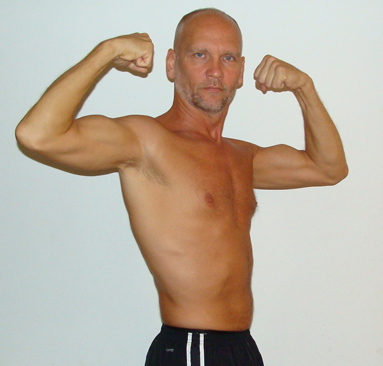
How would you describe your training program?
Eat when I normally eat. Exercise whenever I want, wherever I want, however I want, as often as I want, and as long or short as I want. I am not in “training” per se for any events, or races; as I've retired from the competitive plane, and opt more for the collaborative one. I “train” not for personal best either. I train for enjoyment, preventive maintenance, and over-all well-being.
Since I've begun to eat a plant-based diet I feel I've found the fountain of youth, and my muscles have responded unlike they've ever responded to any diet or workout I have ever tried. It's like being on Nature's steroids! It's just a kick to see what I can do, and how I can look eating a plant-based vegan diet, while being 45 years old. I have excellent cellular regeneration, and quick recovery from any activity.
Since I've completed running competitively I simply run for fun, and I have been running nearly every day too. I don't really require recovery time either. I may take a day off once a week to “fast” from exercise. I cycle around when I can get a chance; I'm my mothers care-giver now so it's not often I do that. Before my runs I like to do either an Ab workout, some push-ups with the push-up bars, maybe some chin-ups, or a kettle-bell routine. Afterward I'll do a yoga session to cool down and stretch. Normally I have a yoga routine each day to do to keep up my teaching skills, and I meditate twice a day.
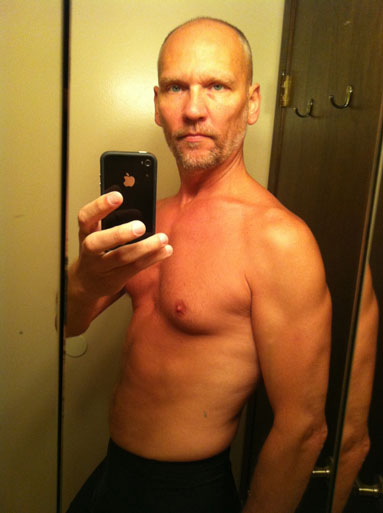
What kind of supplements do you use if any, and why?
I use Vega brand Smoothie Infusion. Other super foods items I use on occasion are maca powder, chlorophyll, chlorella, molasses, hemp oil, goji berries, mesquite powder, Acai, Chia seeds, cacao, and many more I cannot recall. Anything vegan and as nutrient dense and unprocessed as possible.
What are some common misconceptions about veganism?
That you can't get enough protein, and are probably anemic. That there isn't enough energy for endurance or strength if you don't eat meat. That you don't have good circulation. I even had a woman at a health food store think she knew something about it and said “let me see your fingers.” I held out my hand and she pinched my finger to check the rate of blood returning to the tip, and it replenished quickly. Her look was in shock after I told her to do herself, and it was dramatically slower.
What do you think the most important aspect of fitness is?
Well-being in a disease-free and fit body, preventive maintenance over time, and longevity.
What do you like best about being vegan?
Not being sick since 1996 due to a diet choice and a waste-free body. Not even a single headache.
What do you like best about being fit?
I can out-work a 20-year old in manual labor all day long! I look great, and all ladies young and old respect and appreciate my form.
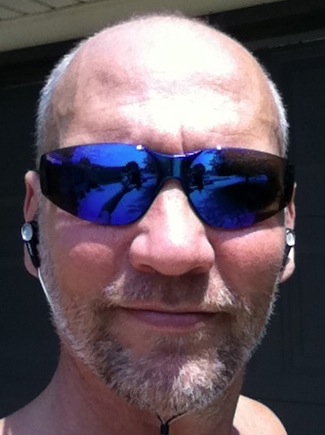
What are your strengths as an athlete?
As a yoga teacher on a plant-based diet I notice an increase in creating space in the body. I think that the TV series Survivor would categorize it as out-lasting, or longevity. This will have to wait to be seen, then again, I may be my only witness. ;^]
What advice do you have for vegan athletes who are just starting out?
Listen to your body, it is king not you. You are a commander, but you have to respect the ship. Intuit what the body is telling you on a play-by-play basis. You can push yourself, yet as it's said even in yoga...utilize a 3/4 effort of your capacity, never 100%. Know when enough is enough, and quit if you have to. In the military we had a saying that there's a fine line between being gung-ho and stupid.
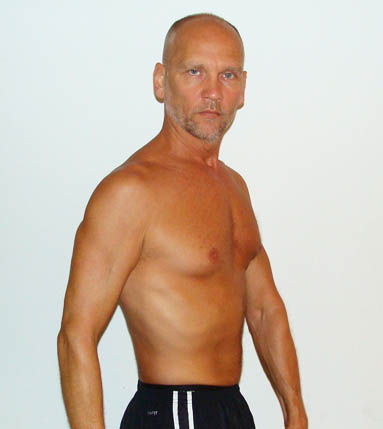
What advice do you have for people who are thinking of becoming vegan?
Don't allow criticism from others to sway you if you choose a lifestyle change, this goes for anything. I still get teased after 20 years by my meat-eatings acquaintances, but it doesn't bother me a bit. I'll live longer than all of them, look better longer, heal better and faster, and feel better too. There is immediate as well as deferred gratification.
Maintain a 3/4 raw and 1/4 cooked vegan diet, with a good deal of greens, and keep the protein count lower than the carbohydrates; about 80/20. Food confusion is a key to use with diet just like muscle confusion works for working out. Always stay creative and change things up. You'll eat a lot of the same stuff for a while as you build your cuisine, and cooking skills; not to forget condiments, and vegan food supplies. Drop flour products for the most part. I eat only one bread product now, and that's Ezekiel brand sprouted grain bread. I have yet to learn how to make raw bread.
What motivates you to continue to be a successful vegan athlete?
The results, and the benefits. The cost and pay-off are worth it. Pay a little more for your lifestyle and cuisine, and save money from not having to see a doctor every year. In my annual visits to the VA, my physician has been amazed at my health improving over time in every area.
How has the website www.veganbodybuilding.com helped or inspired you?
It's great to be on par with others as the like of Brendan Brazier, Robert Cheeke, and Tim VanOrden. I've met all three of these guys and they rawk!
Being able to contribute this article in a profile of myself has allowed me to showcase and share my experience of being on a vegan diet, and knowing how it has worked for me will work for anyone else giving it a shot.


Recommended Comments
There are no comments to display.